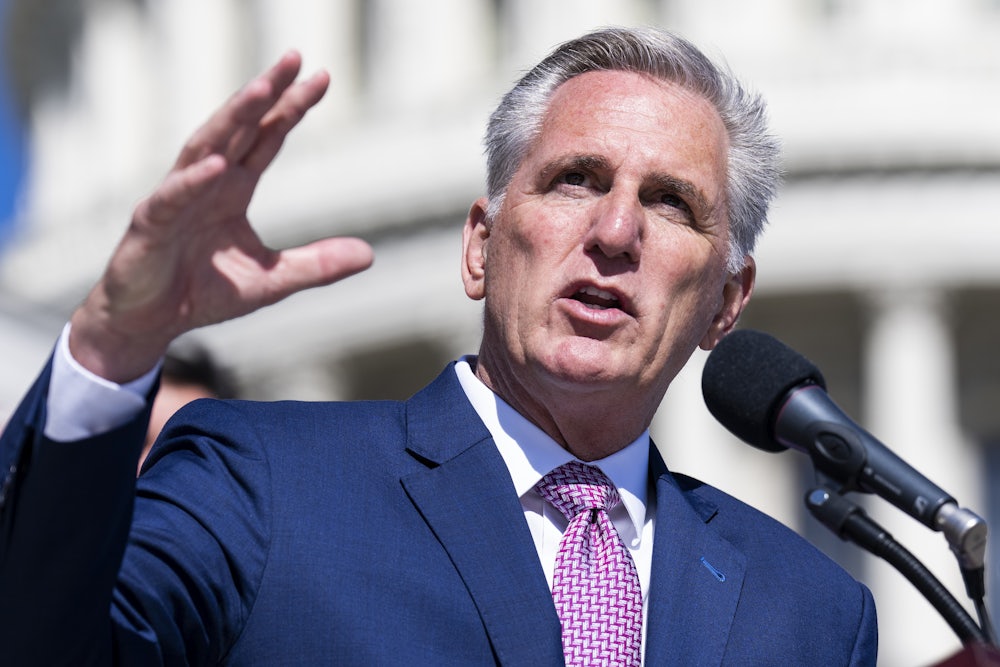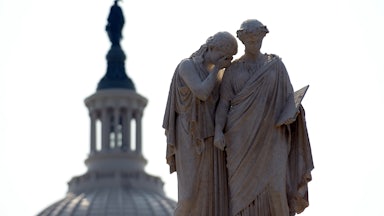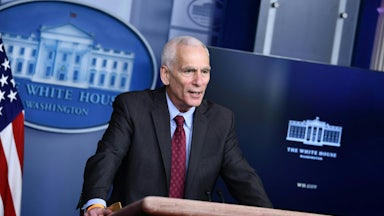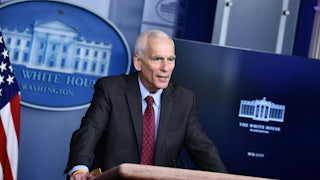There are approximately 20 days until Election Day and a few brief months until a new Congress will be sworn in. Whether that Congress will have a Republican House and Senate remains to be seen. That hasn’t stopped House Minority Leader Kevin McCarthy, the shadow speaker, from measuring the drapes—or, perhaps more accurately, counting the hostages before they are taken.
“You can’t just continue down the path to keep spending and adding to the debt,” McCarthy told Punchbowl News in an interview this week. “And if people want to make a debt ceiling [for a longer period of time], just like anything else, there comes a point in time where, okay, we’ll provide you more money, but you got to change your current behavior. We’re not just going to keep lifting your credit card limit, right? And we should seriously sit together and [figure out] where can we eliminate some waste? Where can we make the economy grow stronger?”
In short, McCarthy plans to return to the tactics pioneered by his predecessors the last time there was a Republican House and a Democratic president: using the debt ceiling as leverage to force cuts in Social Security and Medicare. When Republicans tried this stunt against Barack Obama in the early 2010s, it led to the first-ever downgrading of the U.S. credit rating and brought the nation dangerously close to a default on the national debt. Here we go again.
Some things are inevitable, like death and taxes. (Or maybe just death if the GOP wins this November.) Most things are not. Democrats have a chance to disarm this gun before McCarthy and his colleagues place it to the side of the nation’s head in a few months. If Joe Biden, Nancy Pelosi, Chuck Schumer, and other Democrats do nothing, they will be responsible for the damage that is done.
That Republicans have some dangerous ideas about the debt ceiling isn’t some obscure fact that’s been hidden from view. While the GOP very dutifully raised the debt limit throughout the Trump presidency, it has made its intention about returning to debt ceiling brinksmanship now that a Democratic president is back in the White House abundantly clear. Under Trump, many GOP lawmakers simply voted to increase the debt ceiling whenever it was necessary without any attendant fuss or alarm. This brief flirtation with responsible governance ended as soon as Biden was sworn in. Over the last two years, leading Senate Republicans like Mitch McConnell and John Cornyn have publicly stated that they would not cooperate with debt ceiling increases unless they had a say in broader budgetary matters.
The Constitution does not require the United States to have a debt ceiling. (Denmark is the only other Western democracy that has one.) There are strong arguments, in fact, that the debt ceiling is unconstitutional. But any unilateral attempt to ignore the debt ceiling would likely invite legal challenges from Republicans and their allies, and the Biden administration might be unwilling to risk an adverse ruling from the Supreme Court on the matter. It is also theorized that the president may end the threat of the debt ceiling by minting a $1 trillion platinum coin and stashing it in the Treasury, but it’s unclear that Biden would countenance this kind of Apex Dark Brandon maneuver. Alas, much like the One Ring, the debt ceiling is best destroyed in the fires from which it was made: the federal legislative process.
There is still the perennial problem of the filibuster. West Virginia Senator Joe Manchin and Arizona Senator Kyrsten Sinema have resisted any effort to abolish or curb the 60-vote threshold for most legislation. Rather than count on their senses of duty and honor and hoping for the best, their fellow Democrats could use an easier path forward. The Senate rules allow for a process known as budget reconciliation. While it can’t be used for most types of legislation—Democrats couldn’t use it to pass a new Voting Rights Act, for example—it can be used for most matters related to the budget.
The Washington Post’s Greg Sargent, citing congressional rules experts, wrote last month that Democrats could use the lame-duck session to pass a budget outline that raises the debt ceiling to a level that won’t be reached for years to come. I have previously suggested that we raise it to Avogadro’s number, in part because it is a number large enough that it would amount to a de facto abolition of the debt ceiling, and in part because I want to see right-wing commentators write about Avogadro’s number forever. But Sargent notes that a simpler formulation would work just as well.
“Democrats could set the debt limit at, say, the equivalent of five times the total spending on a particular set of major agencies at that given moment, [Georgetown University law professor David] Super says,” Sargent wrote. “The precise language might not pass muster with the parliamentarian, but it’s worth trying, and if necessary, Democrats could revert to a hard number.” If Avogadro’s number is insufficient, other hard numbers will do. There is a googol, which is a one followed by one hundred zeroes. There is also a googolplex, a number that can only be theoretically written, which is one raised to the power of googol. Other options abound: Graham’s number, Skewes’s number, Moser’s number, and whatever other higher figures can be devised.
If it sounds like I’m treating this as a joke, that’s because it sort of is. The debt ceiling’s original purpose was as a wartime bookkeeping measure during World War I. Contrary to an endless deluge of right-wing propaganda, it does not authorize new debts incurred by Congress. It only limits the Treasury’s ability to pay off existing ones. Republicans know this, but they lie about it because a debt ceiling showdown is their best, likeliest way to enact a blueprint for American social spending that would be otherwise indefensible at the ballot box. The alternative to giving in to their demands is that the world economy will collapse. This is all funny in the same way that Doctor Strangelove was funny.
Aha, you might say, but why would Republican lawmakers do that? They also participate in society. They have 401(k)s and mortgages and other things that would be affected. They get paid in U.S. dollars. All of that is true. But in recent years, they have shown a propensity not to act in the public’s best interest or even their own. This is the same party that so thoroughly argued against vaccines and masks during a pandemic on ideological grounds that the virus began to disproportionately kill its own voters. This is the same party whose leader, with the tacit or explicit support of other prominent conservatives, almost got Congress killed last year during a coup attempt. Assuming that the MAGA caucus will eventually do the right thing would be, to put it mildly, a mistake.
What is deeply unfunny about the whole thing is that Democrats could end this farce at any time and have not yet done so. They have already raised the debt ceiling a number of times while controlling Congress and the White House, which in practical terms means that they kicked the can down the road, delaying the hostage taking for another few years. I don’t mean to deny culpability on the Republicans’ part in this state of affairs. It is absolutely the case that they can quite simply vote not to plunge the country into an economic depression when given the chance. But if January rolls around, a Republican-led Congress sweeps into power, and Democrats effectively hand over the hostage, the rope to tie them up with, and the gun to press to their left temple, they are the ones who will be truly responsible for what happens next.










